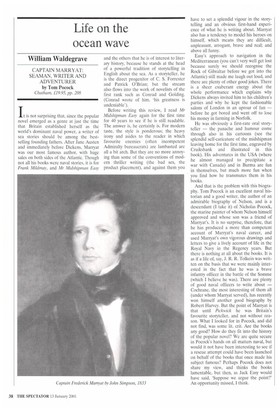Life on the ocean wave
William Waldegrave
CAPTAIN MARRYAT: SEAMAN, WRITER AND ADVENTURER by Tom Pocock Chatham, £19.95, pp. 208 It is not surprising that, since the popular novel emerged as a genre at just the time that Britain established herself as the world's dominant naval power, a writer of sea stories should be among the bestselling founding fathers. After Jane Austen and immediately before Dickens, Marryat was our most famous author, with huge sales on both sides of the Atlantic. Though not all his books were naval stories, it is for Frank Mildmay, and Mr Midshipman Easy and the others that he is of interest to literary history, because he stands at the head of a powerful tradition of storytelling in English about the sea. As a storyteller, he is the direct progenitor of C. S. Forrester and Patrick O'Brian; but the stream also flows into the work of novelists of the first rank such as Conrad and Golding. (Conrad wrote of him, 'his greatness is undeniable').
Before writing this review, I read Mr Midshipman Easy again for the first time for 40 years to see if he is still readable. The answer is, he certainly is. For modern taste, the style is ponderous; the heavy irony and asides to the reader in which favourite enemies (often incompetent Admiralty bureaucrats) are lambasted are all a bit arch. But they are no more annoying than some of the conventions of modern thriller writing (the bad sex, the product placement), and against them you have to set a splendid vigour in the storytelling and an obvious first-hand experience of what he is writing about. Marryat also has a tendency to model his heroes on himself, which means they are difficult, unpleasant, arrogant, brave and real; and above all funny.
Easy's approach to navigation in the Mediterranean (you can't very well get lost because surely we should recognise the Rock of Gibraltar before we got into the Atlantic) still made me laugh out loud, and there are plenty of other good jokes. There is a sheer exuberant energy about the whole performance which explains why Dickens always invited him to his children's parties and why he kept the fashionable salons of London in an uproar of fun — before he got bored and went off to lose his money in farming in Norfolk.
He was obviously a first-rate oral storyteller — the panache and humour come through also in his cartoons (see the splendid self-caricature of the midshipman leaving home for the first time, engraved by Cruikshank and illustrated in this book). His adventures in the USA (where he almost managed to precipitate a war with Canada) and in Burma are fun in themselves, but much more fun when you find how he transmutes them in his books.
And that is the problem with this biography. Tom Pocock is an excellent naval historian and a good writer, the author of an admirable biography of Nelson, and is a descendant (I take it) of Nicholas Pocock, the marine painter of whom Nelson himself approved and whose son was a friend of Marryat's. It is no surprise, therefore, that he has produced a more than competent account of Marryat's naval career, and used Marryat's own vigorous drawings and letters to give a lively account of life in the Royal Navy in the Regency years. But there is nothing at all about the hooks. It is as if a life of, say, J. R. R. Tolkein was written on the basis that we were mainly interested in the fact that he was a brave infantry officer in the battle of the Somme (which I believe he was). There are plenty of good naval officers to write about — Cochrane, the most interesting of them all (under whom Marryat served), has recently won himself another good biography by Robert Harvey. But the point of Marryat is that until Pickwick he was Britain's favourite storyteller, and not without reason. What I looked for in Pocock, and did not find, was some lit. crit. Are the books any good? How do they fit into the history of the popular novel? We are quite secure in Pocock's hands on all matters naval, but would it not have been interesting to see if a rescue attempt could have been launched on behalf of the books that once made his subject famous? Perhaps Pocock does not share my view, and thinks the books lamentable, but then, as Jack Easy would have said, 'Suppose we argue the point?' An opportunity missed, I think.






























































 Previous page
Previous page